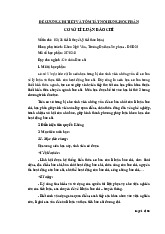

Preview text:
00:03 3/8/24
Luật Điều ước quốc tế Nguyễn Văn Tân KT45C – 094 – 1822 LQT47C Luật Đầu tư quốc tế
The tribunal in SGS v. Philippines was right on everything it said about jurisdiction. Discuss.
1. Jurisdiction under the General Terms
It should be noted that the “umbrella clause” in the Swiss - Pakistan BIT was
formatted in different and rather vaguer terms than Article X(2) of the Swiss - Philippines BIT.
If in the case of SGS vs Pakistan, the court considers the internationalization of
investment contracts and considers the breach of contract as a breach of the treaty.
In the case of SGS vs Philippines, BIT Swiss - Philippines did not mention
internationalization of issues, converting contractual obligations into treaty binding.
According to Article X(1), the provisions of international law or national law,
whichever is more favorable to the investor in the agreement will apply. In particular
it does not change the proper law of the CISS Agreement from the law of the
Philippines to international law. Furthermore, the obligations assumed by the host
country regarding investments and other matters. Collateral guarantees, warranties
given by a host State to induce the entry of foreign investments are binding or not.
They constitute genuine obligations or mere advertisements, will be a matter for
determination under the applicable law, normally the law of the host State.
For Article X(2) to be applicable, the host State must have assumed a legal
obligation, and it must have been assumed the specific investment – not as a matter
of the application of some legal obligation of a general character .
In short, a breach here is a breach of contract and can be governed by the provisions
of the agreement, but it is not a breach of the agreement and is translated under
international law. In the absence of other factors it could be decided by a tribunal about:blank 1/2 00:03 3/8/24
Luật Điều ước quốc tế
constituted concerning to Article VIII(2). The proper law of the CISS Agreement is
the law of the Philippines, which in any event this Tribunal is directed to apply by
Article 42(1) of the ICSID Convention.
The tribunal was right on this issue it said about jurisdiction
2. Jurisdiction over contract claims
Article VIII of the BIT provides for the settlement of “disputes with respect to
investments between a Contracting Party and an investor of the other Contracting
Party”. If a dispute is not resolved by consultations between the parties regarding
Article VIII(1), the investor may submit the dispute “either to the national
jurisdiction of the Contracting Party in whose territory the investment has been made
or to international arbitration”, and in the latter case, at the investor's option, to
ICSID or UNCITRAL arbitration.
However, the ICSID court refused and found that the parties had violated the PSI
Agreement. The Court found itself to have no jurisdiction in this matter because the
Agreement did not mention the Court's jurisdiction.
The Court appears to have been wrong about its jurisdiction in this matter.
3. The exclusive choice of forum clause
Article 12 of the CISS Agreement provides that: “All actions related in connection
with the obligations of either party to this Agreement shall be filed at the Regional
Trial Courts of Makati or Manila.
The court did not require SGS to proceed with the proceedings in the local courts
and then the ICSID courts. Because under Article VIII, SGS can submit to ICSID or UNCITRAL.
Overall, the Court has jurisdiction to consider this case. However, this is only a
violation of the investment contract between the investor and the receiving state, not
a violation of the treaty, and is governed by international law. For this reason, the
Court should not exercise its jurisdiction in a breach of contract case like this,
instead, the Philippine local courts have the authority and willingness to handle cases like this. about:blank 2/2



